Four independent Scottish playwrights to see this Festival
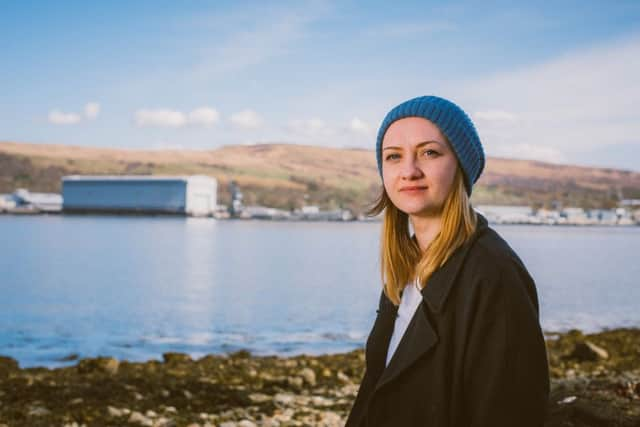

Not content with waiting to be asked, they go out and stage their own work on their own terms. That work ranges from the personal to the political, from the witty to the poignant, and invariably talks directly to audiences in a style that is highly theatrical.
This year’s Fringe is a fine opportunity to catch up with four leading lights of this generation. There is Adura Onashile, who is talking about women’s place under the
Advertisement
Hide AdAdvertisement
Hide Admale gaze; Jenna Watt, considering the pros and cons of nuclear weapons; Kieran Hurley, who is wondering if we’re all doomed; and Rob Drummond, analysing the chemistry and chaos of falling in love.
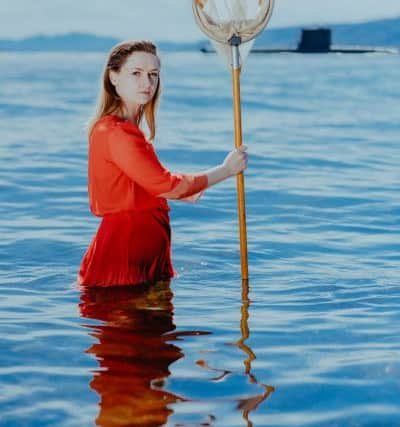

Linking them together is nothing but a desire to engage with the world in a way that is ambitious, serious and playful.
It’s easy to make assumptions about people. Take Jenna Watt. She’s a young theatre-maker often found on the fringes of performance art. In her last show, How You Gonna Live Your Dash, she taped herself into a boiler suit, put a funnel in her mouth, loaded it with paint powder and blew clouds into the air. She was lucky not to choke.
In 2102’s Flâneurs, she celebrated the joy of aimless walking and raged against violent street crime. And in one early piece, she volleyed apples into the audience with a baseball bat.
Knowing all this, you imagine she’ll be a left-leaning arty type and that when she puts on a play called Faslane, as she is doing on the Fringe, it’ll be a peacenik tirade against the horror of nuclear weapons. But no. She may well be a left-leaning arty type, but that’s not what the play is like at all.
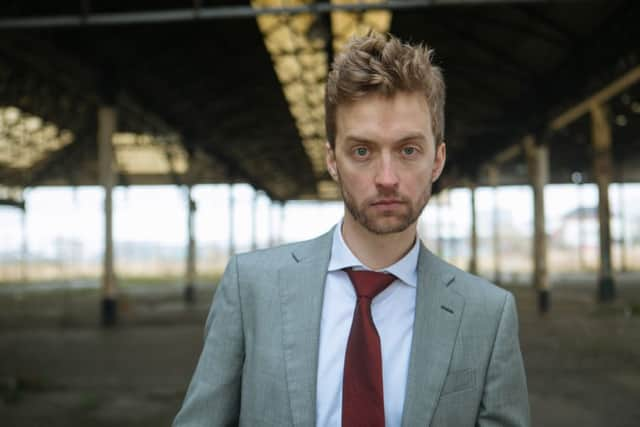

Rather, Faslane is an honest attempt at seeing both sides of the Trident argument. “In the run-up to the Scottish referendum, there was a lot of talk about Trident and jobs at Faslane,” she says. “I thought, ‘This is a big thing, I should really know more about it if I’m going to have an informed vote.’ I made the connection that my family – aunties, uncles and cousins – work in Faslane and surely I should have an informed opinion of what’s happening there.”
She recalls playing five-a-side football with her cousins inside the base on childhood visits from her home in Inverness. She would notice the peace camp outside and have some vague sense of the place being contentious. Now as an adult, with friends protesting at the gates and an uncle who’d been honoured by the Queen for his work on a submarine rescue system, she felt obliged to look a little more deeply into what was at stake.
Advertisement
Hide AdAdvertisement
Hide Ad“Because of the work I do and the circles I mix with, I’d been handed a view that I should be anti-Trident,” she says. “I was like, ‘OK, so that’s how I’m supposed to feel. OK, I’ll take that. I feel safe in that because that’s what everyone else feels around me.’ Then knowing my family are so closely involved and so affected by an anti-Trident agenda, I suddenly realised I was basically saying I don’t support my family, I don’t want them to have jobs and I don’t care.”
To redress the balance and to bridge the gap between the personal and the political, she started interviewing those in the know.
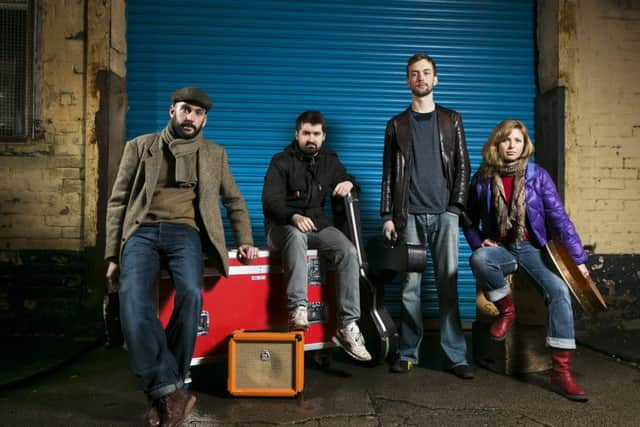

She spoke to people from across the political spectrum, from a retired commodore to a family who had lived in the peace camp in the 1980s. “I was targeting people who would have polarised views,” says Watt, who now lives in Glasgow. “It was really interesting seeing people being opposites to each other.”
On her visits to Her Majesty’s Naval Base Clyde, as it is formally known, she realised how little she knew in detail. Like many of us, she would refer to “Trident” without a clear idea of whether she was referring to a missile, a submarine or a nuclear programme (it’s the latter). “A lot of people who are pro or anti don’t know what Faslane is,” she says. “How can you have such a strong view and not know what’s in Faslane?”
She reasoned the only way she could give everyone a fair hearing was to present herself as a neutral observer. “Throughout the process I’ve gone from feeling strongly one way to the other and back again,” she says. “The people I’ve spoken to have been really convincing and articulate. For me to say that I’m neutral meant they knew I was going to listen and not just challenge them all the time.”
She adds: “Being neutral felt safer than saying, ‘I don’t know what to think, I don’t have an opinion, I’ve not engaged with this properly.’ It was more passive because I could just sit and absorb everything.”
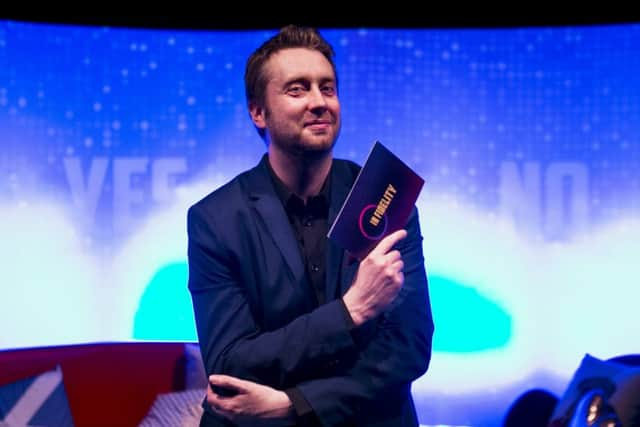

She even managed to stay neutral when joining an anti-Trident demo, although it was an odd position to be in, and it’s a line she’ll maintain throughout the life of the show.
Advertisement
Hide AdAdvertisement
Hide AdOnly after that is she likely to show her hand and get politically active. Having learned how to argue convincingly from both sides, she’ll have a view that’s more nuanced than average.
“My own connection to Faslane means I have a certain complexity regarding the issue,” she says. “That complexity isn’t out there in the debate – all that you have are the polarised views. Being in the middle doesn’t mean that you’re passive or neutral; it means there’s a lot of complexity.”
Keen to avoid the visual clichés of mushroom clouds and airborne missiles, she is working with musician Kim Moore to create an abstract sound design suggesting Geiger counters, submarine sonars and talking heads.
The show reflects the intensity of argument on both sides of the debate, favouring neither one nor the other, but forcing the audience to consider views different from their own. “It’s going to be antagonising for some people, but it’s a piece of theatre, so it’s a safe place to feel that way,” she says. “Just for a moment, you can imagine what it’d be like experiencing the other opinion – and then safely go back to the one that you like!”
Faslane, Summerhall, until 28 August. Today 7:15pm.
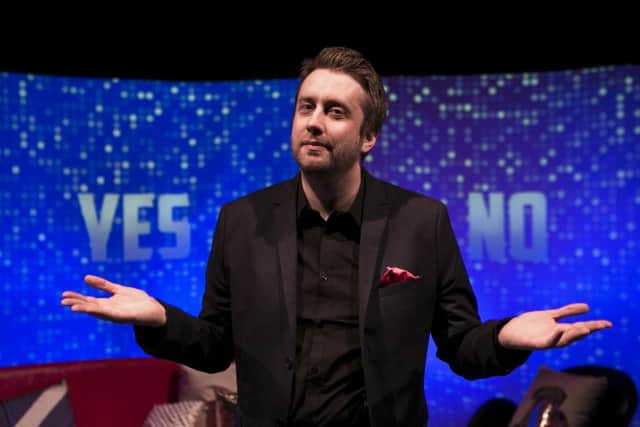

It’s the end of the world as we know it and Kieran Hurley feels – well, he feels like he should be doing a show about it. The Glasgow theatremaker senses we’re living through apocalyptic times and, in Heads Up, he imagines a city on the brink of collapse. “The main impulse for making the show is living in a world that feels like it’s built on disaster and crisis,” he says. “Perhaps every generation feels like this, but I really think we’re living through something seismic.”
His thoughts had been turning towards a “great ending” long before the political turbulence of 2016. Leadership battles at home and abroad, violence across Europe and the Brexit vote have only confirmed his hunch. “My impetus for writing the play was a feeling rather than an analysis,” he says. “That feeling is mainstream now.”
He is not, however, forcing any parallels: “The temptation when something seismic happens that is even tangentially related to your show is to go, ‘Rewrite it and make it a Brexit play’ – but that’s sensibly not what I’ve done.”
Advertisement
Hide AdAdvertisement
Hide AdInstead, the play follows four unrelated characters in an unnamed city as they try to sort out their lives. There’s a venture capitalist working in futures, a 13-year-old gamer in an abusive relationship, an egotistical pop star and a service-industry drone who is under constant surveillance. “They are four detailed snapshots of a bigger story about a place at its end,” says Hurley. “I’m interested in conjuring a sense of this city and these lives.”
Hurley came to attention in 2010 with Hitch, a solo show about the time he hitchhiked across Europe to join an anti-capitalist demo in Italy. His subsequent work includes the rave-culture monologue Beats, winner of a CATS award for best new play, and the ceilidh-like state-of-the-nation collage of Rantin.
He sees Heads Up as a return to his elemental roots, but points out that even with a solo show, he’s a team player. This show began life as he explored ideas with director Alex Swift in a residency supported by the Playwrights’ Studio Scotland. Further ideas were triggered as he worked with composer Michael John McCarthy.
Sitting at a desk, Hurley will have two samplers in front of him, each with 16 channels. As he performs the play, he’ll bring in the various elements of McCarthy’s sound design. “It means the sound has a relationship to how the story is told,” he says. “The sounds become gestures.”
He describes Heads Up as a piece of storytelling rather than an overtly political play, but it is nonetheless underscored by a vision of a society undergoing traumatic change. “It’s a broad, heavy-fisted metaphorical sweep to allow me to talk about what it feels like to live with crisis and catastrophe,” he says.
As he sees it, the crisis affecting the planet on a macro level relates to a breakdown in human relationships on an intimate scale. We’re in an era when people routinely manage their public image on social media, effectively branding themselves like mini-corporations. By placing a financial value on social relationships, capitalism niggles its way into the private corners of our lives.
Throw in the effects of global warming and it feels like we have a recipe for disaster. He sees it as his job to ask how such perceptions, justified or not, affect our lives.
Advertisement
Hide AdAdvertisement
Hide Ad“One mechanism that we have for talking about great endings, from ancient myths to Hollywood disaster movies, is to offer a vision of the apocalypse,” he says. “The question of whether or not things have always felt like this is less interesting to me, because it’s purely abstract, than the question of whether the way we currently live is unsustainable. That’s a concrete question. Is the way we relate to each other as people in this society sustainable?”
Believing we’re living through the “turbulent stages of the end of capitalism”, Hurley is taken by an idea expressed by Fredric Jameson in 2003. In the New Left Review, the Marxist political theorist wrote: “Someone once said that it is easier to imagine the end of the world than to imagine the end of capitalism. We can now revise that and witness the attempt to imagine the end of capitalism by way of imagining the end of the world.”
Heads Up does something similar. “It feels to me like we’ve reached a point where the economic system and its relationship to its resource – our planet – is at a breaking point,” says Hurley. “That’s increasingly accepted as a mainstream idea. It also feels that this specific phase of capitalism that you might call post-Reagan, neo-liberalism is coming to an end, even as darker things still are coming as a replacement. I do feel like we’re in a time of turbulent shift that might not be an all-consuming destructive end, but it’s a time of uncertainty and change.”
This is all very well, but how does a writer find an ending for a play about the apocalypse? “It’s difficult!” he says. “One of the things that the storytelling form allows is the capacity to declare that things are happening because they’re happening. They’re happening in the world of the story and the story only exists in the moment of its telling. I think I found a solution, but the form allows for many solutions.”
Heads Up, Summerhall, until 28 August. Today 7:05pm
Finding a sound-bite to sum up the plays of Rob Drummond is an impossible task. His output defies categorisation.
Consider this selection. In Bullet Catch, he recreated a Victorian music-hall magic act and got a volunteer from the audience to shoot a gun at him. In Quiz Show, he revealed the dark horror of child abuse behind the glitzy façade of TV light entertainment. In Rob Drummond: Wrestling, he staged a fight with three professional wrestlers. And in Mr Write, he dramatised the life story of a child in the audience.
All that links them is their high quality and their unexpectedness.
Advertisement
Hide AdAdvertisement
Hide Ad“I never like to get comfortable enough to not be nervous about it,” says the writer and performer. “It’s probably not very good for my mental health, but I jump around so much I’m always going, ‘How do you do this again?’ I like it because it keeps me on my toes. Never do the same show twice.”
Naturally, his new one, In Fidelity, is different again. As different, in fact, as the two shows that will follow it: The Broons, a mainstage adaptation of the DC Thomson favourite which tours Scotland from September; and Grain in the Blood, a noirish thriller set in an isolated rural community and staged as an autumn co-production between the Traverse and the Tron.
In Fidelity is not just different from the others, it’ll be different every performance. That’s because he’ll be inviting two members of the audience who are single and looking for love to come on stage for a date. The character of the show will depend not only on Drummond’s TED Talk-style script, but on the things each couple says and how well they get on.
“You put two people up there who are looking for love – and they both know they’re there to find love – that’s instantly watchable even if I did nothing else,” says Drummond, who hopes to keep tabs on the volunteers to find out if his theatrical match-making service leads to genuine romance.
The degree of uncertainty means director Steven Atkinson of HighTide Festival Theatre has spent much of rehearsals role-playing possible audience members. “I don’t know who I am any more,” laughs Atkinson, whose 2011 production of Lidless by Frances Ya-Chu Cowhig won a Fringe First.
He adds: “The vast majority of time when you’re in a theatre, you’re just focused on the stage. This play is largely about the audience and the audience being aware of each other.”
Drummond picks up the theme: “Say during the day something happened in the news, this is the type of play that can be watched through that lens. I can even add a line. Each performance will be affected by the context of what’s happened that day.”
Advertisement
Hide AdAdvertisement
Hide Ad